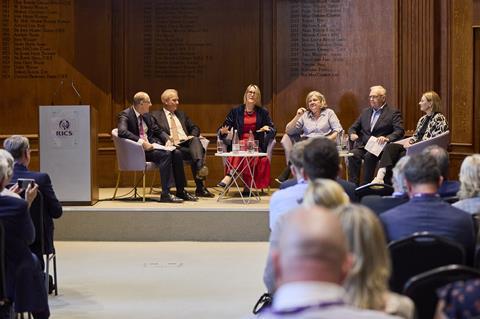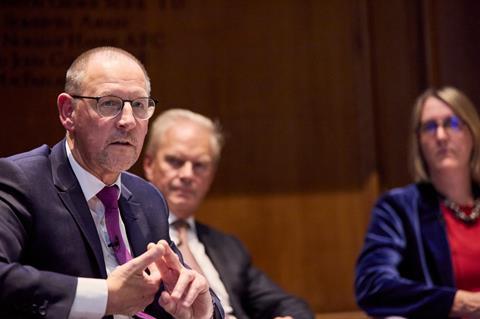Panel event at RICS on Tuesday discussed solutions to the crisis
Keir Starmer should hold a COBRA meeting to deal with the housing crisis if he becomes prime minister after Thursday’s election, according to the co-head of British Land’s Canada Water scheme.
COBRA meetings are typically convened to handle matters of national emergency or major disruption, helping coordinate different departments and agencies in their response.

Emma Cariaga, who is also head of residential at British Land, said that if Labour entered government it would need to “get on and be ambitious from the get-go”.
“Parliamentary terms are finite and some of the scale of the changes they are wanting to get through are controversial and require an element of top down, centralist policymaking,” she said, speaking at a panel event on Tuesday event organised by the RICS.
Cariaga continued: “If I was Keir Starmer, I would be calling a COBRA meeting – I’m not sure there’s ever been a COBRA meeting on housing, but if it’s that much of a national crisis and on the top of everyone’s agenda then it ought to – and then get on very quickly laying down on the statute book the policies that they need to be able to do the changes they want, not least around new towns.
“For me that’s probably going to be the biggest, toughest job to land, and making some ground on that with a landslide majority in the House will be really important”
Urban regeneration expert Jackie Sadek, who co-hosts Housing Today’s Home Truths podcast series, agreed with Cariaga, adding that a “war footing” was necessary to address the issue.

She also urged the next government to encourage a much more prominent role for the public sector.
“The last time we didn’t have a housing crisis was when the state directly intervened in the late 70s – it’s as simple as that,” she said, adding that a “cross-party accord” with the Conservative Party would be necessary to make this happen.
Her podcast co-host Peter Bill, a former editor of Housing Today’s sister title Building, warned against an overly centralized approach.
“You’ve got to look at this situation from the bottom up […] the idea that you can reform the planning system and suddenly magically create one and a half million houses in five years is complete nonsense – it cannot and will not happen,” he said.
“But what you can do is encourage councils in all sorts of ways is to get involved politically in producing homes to reduce their own waiting lists”.
He suggested government give councils grants on a site-by-site basis, allowing them to go out to tender to builders and ask them how many half-market rental homes could be delivered in exchange for the land.
>>See also: Poll shows drastic swing away from Conservatives among homeowners
>>See also: Labour to make major housing announcements ‘within a fortnight’ of winning the election

Stephen Teagle, chief executive of Vistry Partnerships, said a “financially robust purchasing sector” would be crucial to the success of any mass housebuilding project.
“We already see that we have got for-profit RPS, and we’ve got PRS providers and we’ve got global capital looking to invest in UK residential,” he said.
“We need to harness that, but we need support, we need the infrastructure that our housing associations and our local authorities represent.
“My absolute belief is that we need to see a ten-year rent settlement, we need to see 10-year settlement from local authorities.
“The new homes bonus, I think I’m right in saying, is set annually – how can you possibly plan for the production of a housing supply on a 12-month basis”.
Giles Mackay, founder of Heylo Housing agreed that “unless there is a really good financial model that supports all of this demand, it is not going to happen”.
He said that the government needed to be realistic about the money necessary to fix the housing crisis, adding: “You can either borrow it or you can tax it”.










No comments yet